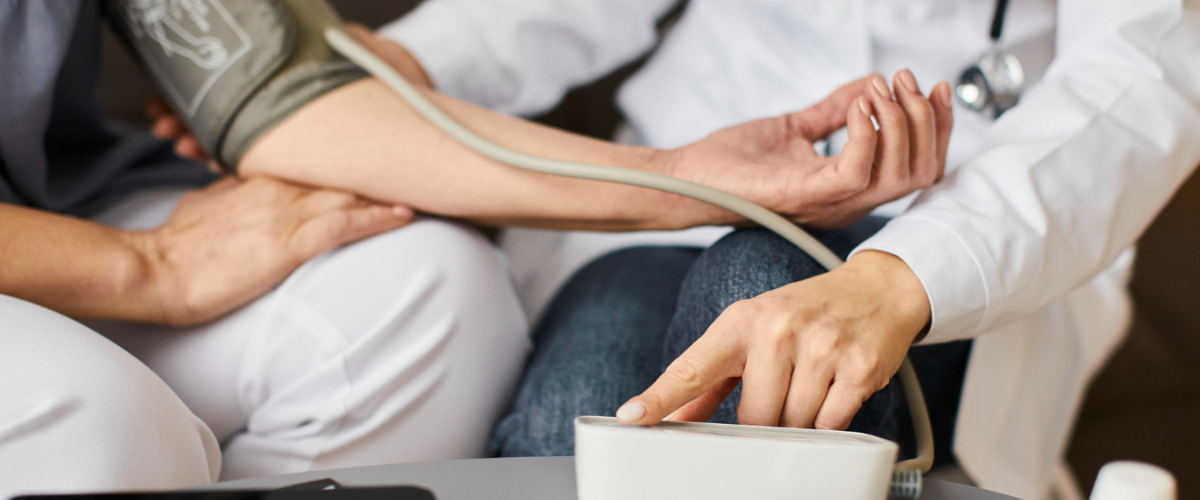
13 Dec How to Lower Your Blood Pressure (Proven Methods)
How to Lower Your Blood Pressure (Proven Methods)
By Island Hospital | December 13, 2024 12:00:00 PM
High blood pressure, often called the “silent killer,” quietly damages your body for years before symptoms appear. Contrary to popular belief, high blood pressure is an issue faced by both the elderly and the young.
This pervasive health concern affects millions worldwide, dramatically increasing the risk of heart disease, stroke, and other life-threatening conditions.
In this article, we’ll cover proven methods to reduce high blood pressure and lessen the risk of heart disease.
Whether you’re looking to lower your numbers or maintain healthy levels, these evidence-based strategies can help you take control of your cardiovascular health.
What is High Blood Pressure (Hypertension)?
High blood pressure, or hypertension, occurs when the force of blood against your artery walls is consistently too high. This condition can lead to serious health issues, including heart disease and stroke, if left untreated.
There are two main types of hypertension:
- Primary Hypertension: Develops gradually over many years with no identifiable cause.
- Secondary Hypertension: Caused by an underlying condition, such as kidney disease or hormonal disorders.
Stages of High Blood Pressure
| Stage | Systolic (mm Hg) | Diastolic (mm Hg) |
|---|---|---|
| Normal | < 120 | < 80 |
| Elevated | 120 - 129 | < 80 |
| Stage 1 Hypertension | 130 - 139 | 80 - 89 |
| Stage 2 Hypertension | ≥ 140 | ≥ 90 |
| Hypertensive Crisis | > 180 | > 120 |
Symptoms and Causes
Many people with high blood pressure experience no symptoms, which is why it’s often referred to as the “silent killer.” When symptoms do occur, they may include headaches, shortness of breath, and nosebleeds.
Common causes of hypertension include:
- Obesity
- High salt intake
- Sedentary lifestyle
- Stress
- Excessive alcohol consumption
- Smoking
Battling high blood pressure? Check out this article on “Managing Hypertension: Tips, Insights, and Strategies for a Healthier Heart”.
Risk Factors
Here are several factors which
- Age: Risk increases with age.
- Ethnicity: Certain ethnic groups, such as those of an African, Caribbean or South Asian background are at higher risk.
- Sex: Men are generally at higher risk than pre-menopausal women.
- Lifestyle: Poor diet, lack of exercise, and smoking significantly increase risk.
- Weight: Men are at increased risk with a waistline over 102 cm; women over 35 inches.
- Family History: Genetics can play a role in hypertension.
- Social and Economic Factors: Stress and limited access to healthcare can contribute.
- Certain Medicines: Some medications can increase blood pressure.
- Certain Medical Conditions: Conditions like diabetes and kidney disease can elevate risk.
Treatments for High Blood Pressure
Types of medications that reduce HBP are:
- Diuretics: Help reduce fluid buildup.
- ACE Inhibitors: Relax blood vessels.
- Calcium Channel Blockers: Lower heart rate and blood pressure.
- Beta-Blockers: Reduce heart workload.
Dosage varies based on individual needs and should be prescribed by a healthcare provider.
Proven Ways to Reduce High Blood Pressure
Making lifestyle changes can have a significant impact on managing high blood pressure. Here’s a more in-depth look at key lifestyle modifications that can help reduce hypertension.
Exercise Regularly
Engaging in physical activity is one of the most effective ways to lower blood pressure. Aim for at least 150 minutes of moderate exercise each week. Here are some activities you can incorporate:
- Walking: A brisk walk for 30 minutes most days can lower blood pressure significantly. It’s accessible and easy to integrate into daily routines.
- Cycling: Whether outdoors or on a stationary bike, cycling helps improve cardiovascular health and can be a fun, low-impact option.
- Swimming: This full-body workout is excellent for building endurance without putting stress on your joints, making it ideal for people of all fitness levels.
- Yoga: Incorporating yoga can enhance flexibility, strength, and relaxation. Studies show that regular yoga practice can help lower blood pressure.
- Strength Training: Lifting weights or using resistance bands twice a week helps build muscle and can have a favourable effect on blood pressure by improving overall metabolic health.
Maintain a Healthy Diet
Adopting a heart-healthy diet is crucial in managing blood pressure. Focus on the following dietary changes:
1. Limit Salt Intake
High sodium intake can increase blood pressure. Aim for 2,300 mg or less per day, and ideally, target 1,500 mg if you have hypertension. Reading nutrition labels and cooking with herbs and spices instead of salt can help reduce your intake.
2. Increase Potassium Intake
Potassium helps balance sodium levels in the body. Aim to consume foods rich in potassium, such as:
- Fruits: Bananas, oranges, and cantaloupes.
- Vegetables: Spinach, sweet potatoes, and avocados.
- Legumes: Beans and lentils.
3. Consider Supplements
Consult your healthcare provider about potassium supplements or other dietary aids that may assist in lowering blood pressure.
Bonus: Sample Meal Plan Idea
Here’s a simple and healthy meal plan to get you started:
| Meal | Suggestion |
|---|---|
| Breakfast | Oatmeal topped with sliced bananas and a handful of nuts. This provides fibre, healthy fats, and potassium. |
| Lunch | Grilled chicken salad with a variety of leafy greens, cherry tomatoes, cucumbers, and a vinaigrette dressing. This meal is rich in protein and vitamins while being low in sodium. |
| Dinner | Baked salmon served with quinoa and steamed broccoli. Salmon provides omega-3 fatty acids, which are beneficial for heart health, while quinoa is a whole grain that offers additional fibre. |
| Snacks (in-between-meals) | Opt for carrot sticks with hummus, or fresh fruit like an apple or pear. These snacks are nutritious and low in calories. |
Learn more about what foods to eat and avoid in our article on “Simple Tips for a Heart Healthy Diet“.
Make Healthy Lifestyle Changes
In addition to diet and exercise, other lifestyle factors play a significant role in managing blood pressure:
- Limit Alcohol Consumption: Drinking alcohol in moderation can help maintain healthy blood pressure levels. For most adults, moderation means up to one drink per day for women and two drinks per day for men.
- Quit Smoking: Smoking raises blood pressure and damages blood vessels. Quitting can significantly improve cardiovascular health and lower hypertension risks.
- Get Sufficient, Quality Sleep: Aim for 7-9 hours of restful sleep each night. Poor sleep patterns can contribute to high blood pressure. Establishing a consistent sleep schedule and creating a calming bedtime routine can enhance sleep quality.
- Manage Stress: Chronic stress can contribute to high blood pressure. Techniques such as mindfulness, meditation, and deep breathing exercises can help reduce stress levels. Engaging in hobbies, spending time in nature, or practising relaxation techniques can also be beneficial.
- Keep Track of Your Blood Pressure: Regular monitoring of your blood pressure at home can help you and your healthcare provider assess how well your lifestyle changes are working. Maintaining a log of your readings can provide valuable information during doctor visits.
Conclusion
By understanding high blood pressure’s causes, symptoms, and treatment options, along with adopting a healthier lifestyle, you can effectively manage hypertension and reduce the risk of heart disease.
Regular monitoring and consultation with healthcare providers are crucial for maintaining optimal heart health.
At Island Hospital, we understand the importance of comprehensive heart care. Our Cardiology Department and Heart Centre are equipped with advanced technology and staffed by a dedicated team of professional cardiologists, nurses, and support staff.
Our commitment to excellence has earned us local and worldwide recognition:
- A finalist for Malaysia’s Flagship Medical Tourism Hospital Programme
- A place on Newsweek’s lists of World’s Best Hospitals 2024
- A place Best Specialized Hospitals Asia Pacific 2024 (Cardiology).
Hence, whether you are seeking preventive care, diagnostic services, or advanced treatments for heart-related conditions, Island Hospital is your trusted partner in achieving optimal cardiovascular health.
FAQ
How do I read my blood pressure measurements at home?
Blood pressure is recorded as two numbers: systolic (the top number) over diastolic (the bottom number), measured in millimetres of mercury (mmHg). For example, 120/80 mmHg. Normal is typically below 120/80 mmHg.
What are some recommended tests should I undergo after being diagnosed with high blood pressure?
Common tests include blood tests (to check cholesterol and kidney function), an electrocardiogram (ECG) to assess heart health, and possibly an echocardiogram or stress test to evaluate heart function.
What food lowers blood pressure quickly?
Foods rich in potassium (like bananas and spinach), beets, dark chocolate, and fatty fish (like salmon) can help lower blood pressure. Staying hydrated and reducing sodium intake also supports blood pressure management.
How often should I monitor my blood pressure at home?
If you have high blood pressure, check it at least once daily at the same time. If you’re stabilising or adjusting medication, more frequent monitoring may be necessary. Follow your healthcare provider’s advice.
When should I go to the ER?
Seek emergency help if you experience severe headache, vision changes, chest pain, shortness of breath, confusion, or if your blood pressure readings are extremely high (e.g., over 180/120 mmHg) with symptoms.
How to reduce high blood pressure during pregnancy?
Focus on a balanced diet rich in fruits, vegetables, and whole grains, stay hydrated, engage in regular moderate exercise (with your doctor’s approval), manage stress, and attend regular prenatal check-ups for monitoring and guidance.
Related Doctors
| Derived from | Complications |
|---|






